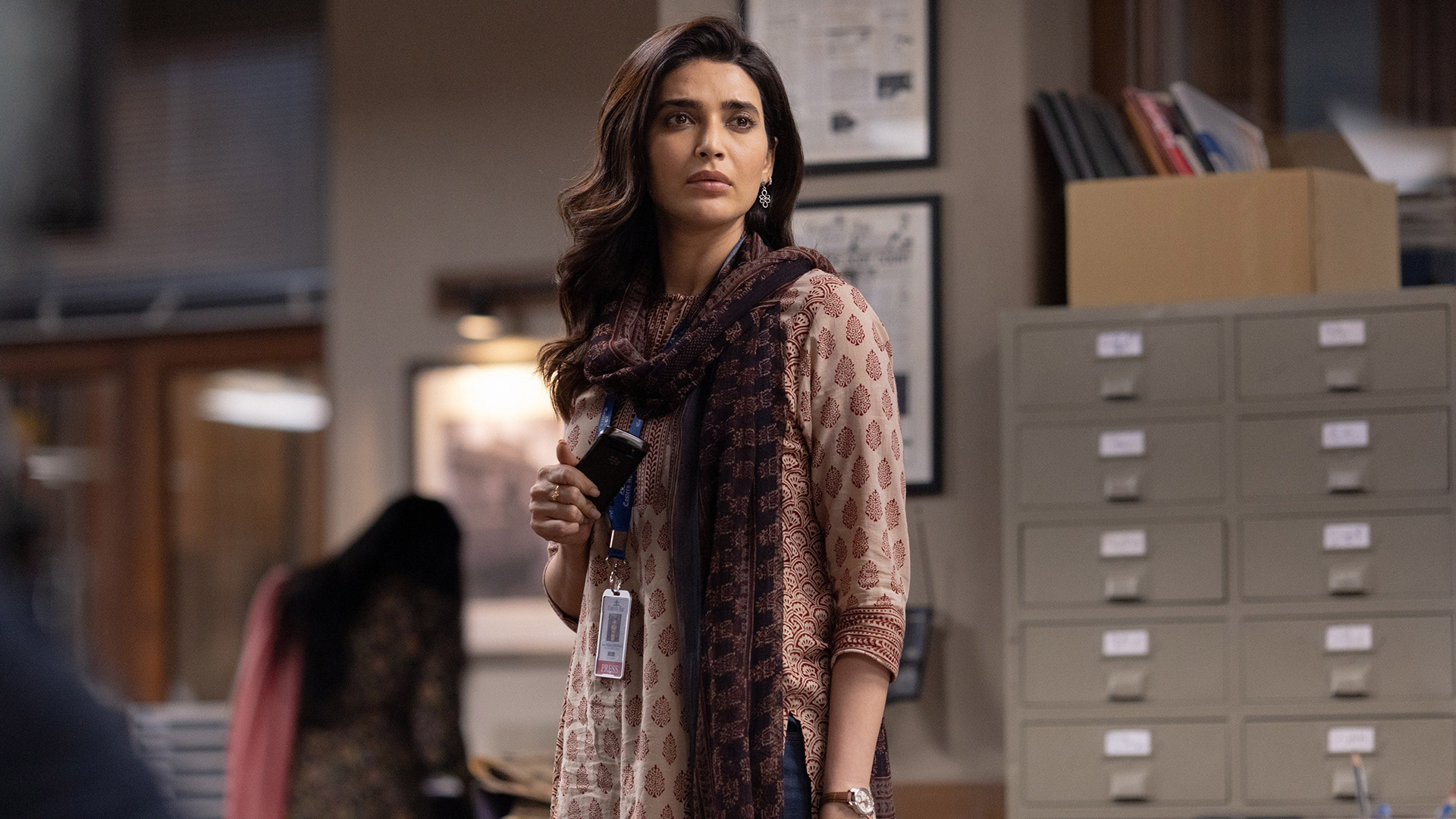Netflix India’s recent offering, Scoop, is based on the real-life story of journalist Jigna Vora who was imprisoned on the trumped-up charge of the murder of a fellow journalist, Jyotirmoy Dey, in November 2011.
Crime, intrigue, and journalism
Five months before the arrest, Dey had been shot to death by unidentified assailants. Because Vora and Dey both reported about the underworld (most notably on Dawood Ibrahim and Chota Rajan) the case quickly became a very high-profile one enveloping top cops, journalists, and India’s most wanted criminals. Vora was charged under the dreaded MCOCA, i.e. the Maharashtra Control of Organised Crime Act, and was jailed for nine months. She had to fight a seven-year-long legal battle to clear her name and be acquitted of the charges. In 2019, she published an account of her experience, The Bars in Byculla: My Days in Prison.
Directed by Hansal Mehta, Scoop is a riveting watch with stellar performances by Karishma Tanna, Harman Baweja, and Mohammed Zeeshan Ayyub. The names of their characters are changed, but they play Vora, Himanshu Roy and S. Hussain Zaidi, respectively. At the time of this case, Vora was the deputy bureau chief of Asian Age, where Zaidi was her editor and mentor. Roy was the Joint Commissioner of Police in Mumbai at the time, and died by suicide in 2018.
The three actors, each essaying a complicated and significant part, play their roles with equal parts subtlety and urgency, just what their characters require. The show moves along slowly, but consistently reveals a deeper and more intricate web between the police, underworld, and crime reporting in Mumbai. If you don’t pay attention, it can be difficult to tell who is working for whom and why.
What is a journalist’s mission?
The central character at the heart of the conflict, Jaideb Sen, is a veteran of crime reporting who is believed to be close to Dawood and sometimes publishes stories against Rajan. Jagruti Pathak, Tanna’s character, manages to get a phone interview with Rajan—in full view of her entire newsroom—and is ultimately nailed for this as supposed evidence of her links with the underworld and role in Sen’s murder. What a layperson may easily miss here is that journalism, especially crime reporting such as this, is essentially all about access. If you have the access, you have the scoop. And if you want to write about the most wanted gangsters, you need to be close to them and their aides. In this case, what does a journalist actually do and how do you make sure that their intentions are not compromised?
This is where Ayyub’s character, named Imran in the series and representing the phenomenal journalist and author Zaidi, becomes important. The journalist is known for his reporting on Dawood Ibrahim—indeed, a joke on the show is how badly he wants to see Ibrahim caught and put behind bars. He published his book, Dongri To Dubai: Six Decades of Mumbai Mafia, in 2012. In the show, it is Imran who never loses sight of what he and his colleagues are doing: reporting about crime to inform the public, rather than making front-page bylines and getting kickbacks for mouthpiece articles. Imran is the anchor that often restrains the highly ambitious Pathak in her never-ending quest for fame, without compromising her ability to get verified and fact-checked exclusive scoops. Sen, also mentored by Imran, works for a rival newspaper, and the rivalries of gangsters reflect the professional rivalries of the two reporters as well. So, when he uncovers something deeply disturbing, he asks Pathak to stop digging and stay away. But Pathak receives it as a threat rather than a warning.
It is in the last episode that the story truly comes together. While talking to a fellow inmate, Pathak recounts this exchange with Sen and goes into what drives such journalists: the adrenaline rush of mingling with high-profile people, the fame, and the power. Her monologue is poignant for what the case did to her not only as a journalist but also as a single mother and a woman. She remarks that all of the influential people she brushed against, whether a police officer or an influential inmate, functioned in essentially the same way. Their ego and power helped her get ahead, but, when push came to shove, she was also crushed under their weight when it suited their objectives. From a star journalist to an accused murderer, she is humbled (and broken) to the point of criticizing her own journalism.
But outside Pathak’s arc, the show raises several important questions. What truly is journalism, for one? Is it about protecting the business interests of media houses, or informing the public? The two can often be at odds. If it is the first, to what extent must a journalist go to get a scoop? If it is about the public, does the fraternity of journalists have the wherewithal to stand by individual reporters in a collective show of upholding truth at great cost? Both Sen and Pathak are subjected to intense character assassinations by their own colleagues and peers. Pathak is accused of illicit relationships with her editor, top cop Shroff (Baweja’s character), and even labeled Rajan’s girlfriend which also gets her targeted by inmates in prison. The implicit assumption is, “How could a woman ever get anywhere in life, if not for men showering undue attention on her in return for romantic or sexual favors?” Her ambition may have made her a bit reckless, but in their schadenfreude and self-interest, most of her fraternity members conveniently forget the endless hours she put into her work, sacrificing her family and personal life, and her ingenuity and patience in getting the intel that helped her rise in her career.
It is not something that she is subjected to only by men, but also by women. Pathak’s rivals who were also women did not pull punches in contributing to her trial. A female intern she was mentoring at the time of her arrest actively turned against and used her to build a career for herself. Played by Inayat Sood, Deepa tries to mimic Pathak in her ambition and drive but with none of her ethics and judgment. In one scene, she even remarks about how boring print media can be and that she’d like to be in broadcast media because they understand that news is “entertainment.” On the other hand, one of Pathak’s main rivals as an inmate turns out to be a woman she had reported on years ago, Rambha Ma. The woman had killed off her husband with the help of her boyfriend and was in jail for the same. She lords it over her fellow female inmates and, when Pathak shows up, leaves no stone unturned in making her life worse. From making sure she cannot eat, bathe, or spend her time in peace while in jail, Rambha Ma subjects Pathak to a personal vendetta for her journalism too.
Caught in a system
While in jail, Pathak also realizes that many inmates are there mostly because of a lack of information. In one instance, she remarks that judges should visit the premises and see how inmates live without basic human dignity. It isn’t just she who is innocent, but many others, except they had none of her will to fight the case, her awareness of laws and court procedures, family and community support, or, finally, good lawyers.
The show also tugs at the deep nexus between the Mumbai Police and the gangsters which it claims it wants to nab at all costs. Pathak was used as a convenient distraction in an effort to toss away Sen’s murder case due to a lack of real evidence as well as the protection of certain top cops. In this view, the work of a journalist becomes even more important and fraught with dangers, requiring more and more protection and support not just from the media fraternity but various stakeholders in the state as well.
That Pathak (like Jigna Vora herself) is eventually acquitted is a testament to the adage that truth alone triumphs—even though in its march to victory it can sometimes fall prey to the selfish interests of the very people that seek to fight for it. Scoop is a must-watch both for its compelling portrayal of a real-life story and for the questions it raises.
[Anton Schauble edited this piece.]
The views expressed in this article are the author’s own and do not necessarily reflect Fair Observer’s editorial policy.
Support Fair Observer
We rely on your support for our independence, diversity and quality.
For more than 10 years, Fair Observer has been free, fair and independent. No billionaire owns us, no advertisers control us. We are a reader-supported nonprofit. Unlike many other publications, we keep our content free for readers regardless of where they live or whether they can afford to pay. We have no paywalls and no ads.
In the post-truth era of fake news, echo chambers and filter bubbles, we publish a plurality of perspectives from around the world. Anyone can publish with us, but everyone goes through a rigorous editorial process. So, you get fact-checked, well-reasoned content instead of noise.
We publish 3,000+ voices from 90+ countries. We also conduct education and training programs
on subjects ranging from digital media and journalism to writing and critical thinking. This
doesn’t come cheap. Servers, editors, trainers and web developers cost
money.
Please consider supporting us on a regular basis as a recurring donor or a
sustaining member.
Will you support FO’s journalism?
We rely on your support for our independence, diversity and quality.










Comment